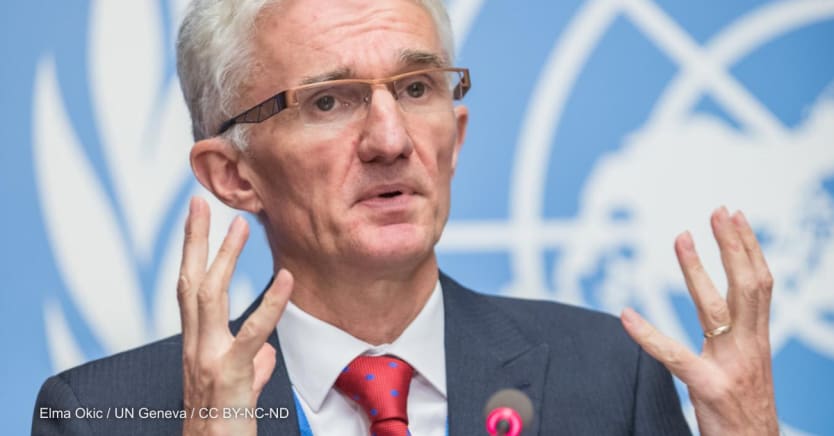
Amid growing fears of famine in Afghanistan, former senior United Nations official Mark Lowcock is urging the United Kingdom to “get on with” spending its aid pledge to the country following uncertainty over how much humanitarian funding had been released.
Afghanistan is facing a dire humanitarian crisis, with the potential to lead to “very large-scale loss of life” if no interventions are made, according to Lowcock, former undersecretary-general for humanitarian affairs and emergency relief coordinator.
The U.K. government has received repeated criticism for a perceived lack of clarity and urgency over how it has distributed aid funds for Afghanistan.
While the government announced in August that it had allocated £286 million to Afghanistan this fiscal year, £145 million ($196 million) — a little over half — has been disbursed so far, James Cleverly, a minister at the Foreign, Commonwealth & Development Office, told Parliament on Tuesday. The current fiscal year ends in April.
“This is quite a long-standing commitment now,” Lowcock told Devex in an interview. “I think it's a problem to announce a lot of money and then not spend it. There’s an urgent problem, and I really do think they [the government] should get on with fulfilling the pledge they've made,” he said.
“A lot of that pledge people interpreted as about dealing with 2021 problems. Now we're seeing for 2022 there's a much, much bigger problem,” added Lowcock, who also previously served as the top official in the U.K. Department for International Development, which was controversially merged with the Foreign & Commonwealth Office to form FCDO in 2020. According to Save the Children UK, food insecurity affects 98% of families in Afghanistan, and 5 million children are at risk of famine.
The U.K. government doubled its aid allocation to Afghanistan amid the shock of the Taliban takeover last year. But the government’s planned contribution remains less than the £292 million spent on the country in 2019, prior to the aid cuts policy.
Spending aid in the country needs to be done with caution, according to Cleverly.
“We are still ensuring that money is distributed,” he told members of Parliament. But he made the point that “doing so quickly can sometimes come at the cost of doing so carefully.”
“We want to ensure that our money reaches the people who are in need and is not diverted to support the Taliban regime,” Cleverly continued. “The U.K. has been, and remains, at the forefront of international efforts to support Afghanistan.”
“It's a problem to announce a lot of money and then not spend it.”
— Mark Lowcock, former undersecretary-general for humanitarian affairs and emergency relief coordinator, United NationsExpanding on a letter he co-wrote with other former senior U.K. officials suggesting humanitarian policies for Afghanistan, which was published this week in the Guardian, Lowcock told Devex that U.N. agencies could be used to pay the salaries of essential workers such as teachers and sanitation and water workers, which would have the secondary benefit of getting some money into the economy. Sanctions and frozen assets have contributed to a crippling economic crisis in Afghanistan, increasing poverty.
Fully funding the United Nations’ $5 billion humanitarian appeal — the organization’s largest — would allow food to be imported into the country, Lowcock added. He voiced support for a summit focused on Afghanistan, as called for by some NGOs and politicians, as “these tend to act as a mechanism to force decisions to happen and move things on.”
He added that “enhanced dialogue and senior decision-making” is needed among humanitarian donors.
Much of the difficulty around funding projects in Afghanistan stems from the Taliban being an enemy of the U.K. for many years. But politicians are facing increasing calls to engage with the hard-line Islamist group.
“We do recognize there is a pragmatic need to have a relationship of some sort with the Taliban,” Cleverly told MPs. “However, our conditions for this have always been clear: They need to renounce violence, not be a haven for terrorism, and not take part in reprisal actions.”
Lowcock said: “We need to be realistic. There are some limits to U.K. influence and leverage over this now.” He suggested trying to build a “strong alliance and partnership with others who may collectively bring more weight to bear.”








